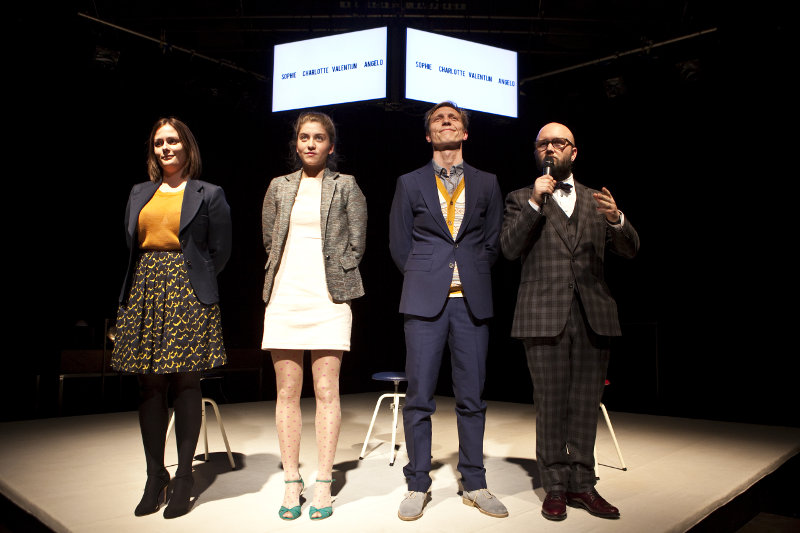Roman, Charlotte, Sophie, David, Valentijn. Who will you vote for? Who will I vote for?
Voting here in this theatre set-up is anonymous, just as it is in the ballot box in the wider world. As we come into the auditorium we are issued with little electronic devices that will allow us to tap in our votes. We start with some straightforward questions: Are we male or female? Married, in a relationship, single? Which age group? Enter our contestants. All relatively young, all white. Three men (plus a male MC), two women. We have, at this stage, nothing to go on other than how they look (but let’s face it, we make snap judgements every day of our lives based on what we see/perceive/judge people to be, based on how they look).
So who do I choose? And how do I choose? Choose for what, I want to ask. To be friends with, to have sex with, to nurse me when I’m sick, to build shelves for me, to entertain me? I decide on Charlotte – the logic being that this is a theatre show, and I’ve seen her perform before and like her stage presence, so I want her to stay. At the very last moment I switch my vote to Roman, the renegade one, just for the hell of it. It’s a game, so let’s play games. Charlotte gets eliminated, and I feel sad – it’s my fault! And so it goes. This is democracy. You could argue that it is a theatre game, it doesn’t matter – but out there in the real world (whatever that might be), people vote for other people, including the people that will take crucial life-changing decisions on their behalf, for all sorts of strange and often trivial reasons. How many people vote for a candidate they really know and trust, and how many for someone they just like the look of? I like Valentijn’s cool mod looks (which he, oddly, describes as old-fashioned), and his gentle humour. David looks gormless, although he has a pleasant self-deprecating air. I don’t like Sophie’s sassiness, she’s too much of a winner, too much of a networker, always saying what people want to hear – and her sheer black tights and high-heels don’t feel right for a sunny afternoon.
For much of the time it’s all gentle fun. There are a few edgy moments, a few unsettling questions, and these I like. There’s a question about our response to offensive words (‘nigger, faggot, cunt, retard’) that offers one of the contestants the opportunity to adopt the legendary Lenny Bruce stance that saying the words out loud breaks their power. A question about whether audience members consider themselves to be racist, sexist, or violent brings forth the predictable response that most of this middle-aged middle-class group do not believe themselves to be any of the above. Liar, liar pants on fire! Anyone who knows anything knows that they are kidding themselves.
Director Alexander Devriendt sees the key element of the show to be the emphasis on democracy – the voice of the majority. That’s what he wants to explore, and there is thus no singling out of lone voices to express their views or to challenge the majority decision. There is, though, a moment when a sizeable minority is gathered up on stage – the voice of protest. There is also some clever play on the engineering of voting decisions – candidates at one point encouraged to form coalitions to eliminate other candidates.
All is done with the usual Ontroerend Goed flair and panache. Strong performances, simple but effective staging – and a thought-provoking premise: What does it feel like to be in the majority? What does it feel like to go against the grain? And who the hell needs consensus politics if there’s a revolution to be had?

